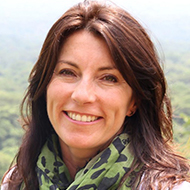
Zoologist celebrates the female of the species and explains what we can all learn from sloths.
Award-winning TV presenter, producer, and zoologist Lucy Cooke has spoken of the importance of slowing down and ‘releasing our inner sloth’ as the nation begins to ease out of lockdown.
Speaking at the virtual BSAVA Congress on Thursday (25 March), the wildlife presenter talked about her work with lemurs in Madagascar and her passion for sloths, which she believes we can all learn a great deal from.
With around 77 per cent of the veterinary workforce being female, Lucy also shared insights into her new book on female animals, Bitch, the female of the species is more deadly than the male. She pointed out that there has been a ‘revolution’ in our understanding of female animals, which has been lead by mostly female scientists.
“Darwin portrayed female animals as passive, coy and irrelevant to evolution. So they went unstudied,” she said. “In the last few decades, there has been a revolution in our understanding of female animals, spearheaded by mostly female scientists. They've shown that being female covers a diverse range of physiology and behaviours - dominance, aggression, promiscuity, competitiveness - but also how females exert as much, if not more, influence on the path of evolution.”
On the topic of sloths, Lucy believes that, rather than ridiculing the sloth for being different, we should try to learn from it instead. She explained that while sloths might have a reputation for being lazy, they are actually ‘energy-saving icons’ and have much to teach us about sustainable living.
In a bid to spread the word about sloths and the environment, Lucy established the Sloth Appreciation Society – or Slothville – described as an ‘online hub for all things sloth’. Through this platform, Lucy seeks to both protect the sloth and promote the truth about its lazy lifestyle.
In its manifesto, detailed below, the Sloth Appreciation Society calls on its members to reduce waste, recycle creatively and eat more plants - just like a sloth.
- slow down
- be mindful
- reduce wasteful convenience
- be economical with energy
- recycle creatively
- hug a tree.



 The Veterinary Medicines Directorate (VMD) is inviting applications from veterinary students to attend a one-week extramural studies (EMS) placement in July 2026.
The Veterinary Medicines Directorate (VMD) is inviting applications from veterinary students to attend a one-week extramural studies (EMS) placement in July 2026.